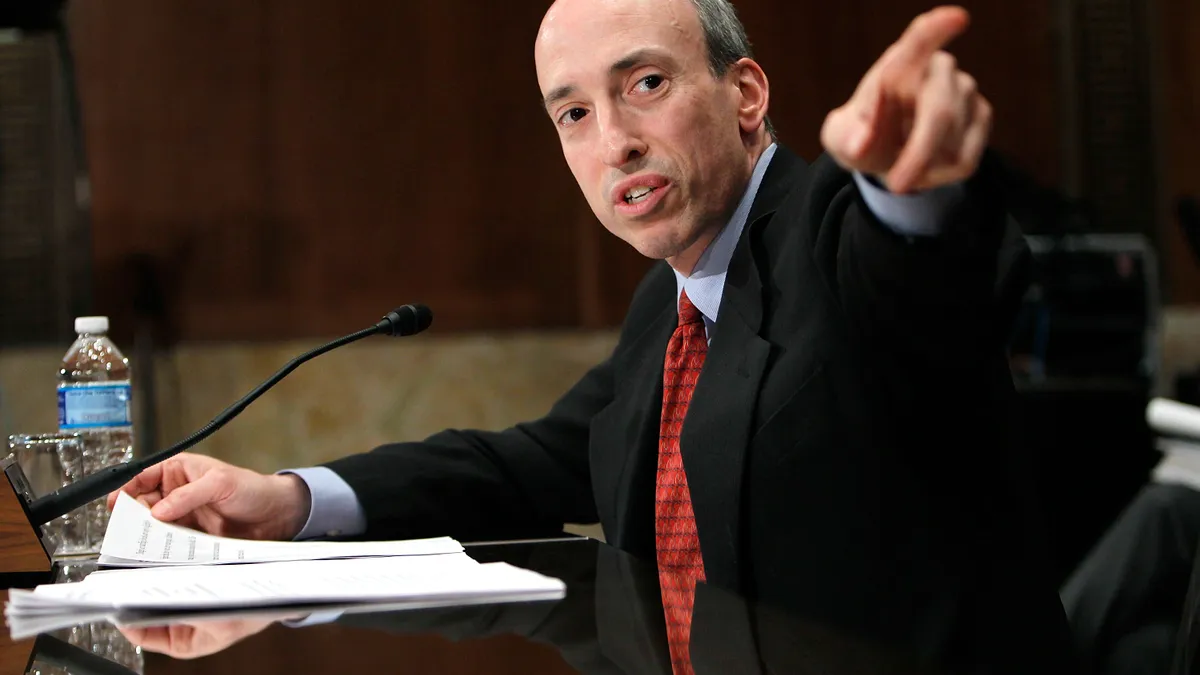Dive Brief:
- The U.S. Chamber of Commerce sued the Securities and Exchange Commission seeking to overturn a recently enacted rule requiring companies to provide more details on stock buybacks.
- The regulation, narrowly approved this month by the SEC, will harm shareholders, obstruct the efficient flow of capital and lead to excessive government intrusion in business decisions, the U.S. Chamber said in its filing Friday. Among its provisions, the rule requires disclosure of daily stock repurchase activity on a quarterly or semi-annual basis, depending on the type of company.
- The SEC regulation “puts the thumb on the scale to discourage buybacks despite the fact that the repurchasing of shares improves returns for savers and investors across the economy,” U.S. Chamber Executive Vice President Neil Bradley said in a statement.
Dive Insight:
The suit by the U.S. Chamber is the newest flare-up in business opposition to regulatory plans by SEC Chair Gary Gensler. Proposals to require disclosure on corporate board diversity, “human capital management,” and climate risk and greenhouse gas emissions have also come under fire.
Gensler hailed the share repurchase rule following the commission’s 3-2 vote of approval on May 3, saying it will “help lessen some of the information asymmetries inherent between issuers and investors in buybacks.”
Share repurchases have ballooned in recent years, increasing to more than $1.25 trillion last year from $950 billion in 2021, Gensler said.
Stock buybacks often push up share prices and, unlike dividends, offer companies a way to reward investors without triggering an immediate tax liability.
President Joe Biden during his state of the union address in February criticized oil companies for stock repurchases that he said benefited “CEOs and shareholders.” He supported a legislative effort to increase to 4% a 1% tax on buybacks included last year in the Inflation Reduction Act.
“Americans need to know that instead of raising wages, scaling up production and investing in research and development, corporate executives spend billions on buybacks that enrich themselves and Wall Street,” Sen. Sherrod Brown, an Ohio Democrat and chair of the Senate Banking Committee, said in a statement after the SEC approved the stock repurchase regulation.
“This new rule will increase transparency and accountability when corporations buy back their own stock,” according to Brown, co-sponsor of the bill that would increase the tax on buybacks.
The U.S. Chamber said the new regulation will reduce the flow of capital to its most productive uses and subject companies to “government micromanagement.”
The rule “will hurt the retirement savings of millions of Americans and result in slower economic growth,” according to Tom Quaadman, executive vice president of the U.S. Chamber’s Center for Capital Markets and Competitiveness.
“It is unfortunate that the SEC chose to prioritize political policies over American investors and the best interests of the economy,” he said in a statement. The Texas Association of Business and Longview Chamber of Commerce are co-plaintiffs in the lawsuit.
Beginning in the fourth quarter the regulation will require companies to disclose the number of shares repurchased and the average price paid during each day of a buyback. They will also need to indicate whether certain executives and directors traded in securities in the four business days before or after the announcement of a repurchase plan.
Moreover, companies under the rule must describe the objective or rationale for a buyback and the criteria for determining the amount of repurchases.















